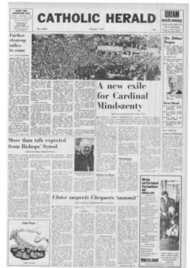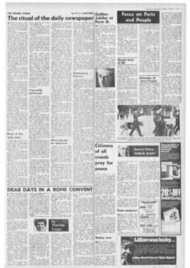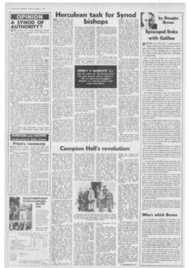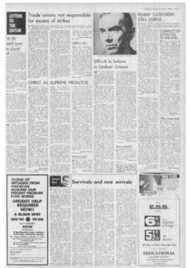Page 4, 1st October 1971
Page 4

Report an error
Noticed an error on this page?If you've noticed an error in this article please click here to report it.
Tags
Share
Related articles
How Catholics Returned To Oxford
Catholicism Puts Down New Roots In An Ancient Setting
Catholics And Oxford
The Vocation Of A Catholic Don
Resident Chaplaincy Set Up At Liverpool University
On the other side, the Statutes of the University of
Oxford permitted any M.A. of the University in good standing, who had been resident in Oxford for at least a year, to open a "private Hall" whose members enjoy the same privileges as the members of the older Colleges. In 1895, then, Father Richard Clarke, a former fellow of St. John's (and incidentally a rowing blue) was posted by his superiors to St. Aloysius Church to set up such a hall for Jesuit undergraduates.
He found a small house, 40 St. Giles, to which, on September 10, 1896, came four Jesuit scholastics, the forerunners of a large host. One of the four wrote at the time : "We are like men cutting their way through a virgin forest; we can see but little in front of us .. . " They were conscious pioneers. "For the first time since the Reformation there were religious enrolled on the University lists".
On October 25, 1970, the day on which the Forty Martyrs were canonised in Rome, the Master of Campion Hall together with his community were present in the chapel of St. John's College (of which Edmund Campion and two of his fellow-martyrs had been members) to hear the President greet them with these words: "Let me first say that it is a privilege to welcome our friends from Campion Hall here to-day and to thank them for the charitable disposition and generosity of spirit which have moved them 'to come to celebrate this great event in their history in this chapel".
The story of the intervening three-quarters of a century cannot be recalled in any detail. But some events and names call for special record. Already, within a year of their arrival in Oxford the Jesuits were negotiating with St. John's for the lease of a small hall belonging to that College. "It has the advantage" says our contemporary chronicler "of sufficient architectural pretensions to give it quite an academic appearance " It was to house successive generations of Jesuits for close on forty years, and some of the most distinguished representatives of the Society of Jesus in England spent their undergraduate days there. Outstanding in academic achievement, as he was to be so remarkable in his priestly work, was Father Martindale. There are scores of others who deserve mention but selection would inevitably be odious.
One name above all others, however, must be mentioned that of Fr. Martin D'Arcy, since for close on twenty years he represented Campion Hall to the University and far beyond it. Returning to Oxford in 1927, he soon became well-known throughout the University as a lecturer, but still more for his wide range of friendships and his great personal gifts.
When in 1933 he became Master, the lease of the St. Giles property had only three years to run. It was due to his energy and foresight that the present site in Brewer Street was acquired. He persuaded Sir Edwyn Lutyens to undertake the design, and the result of their collaboration was the splendid building with its happy combination of academic, ecclesiastical and domestic elements. Nor should the contribution of Father Leslie Walker go unmentioned. His down-toearth practicality provided a valuable balance to the artistic enthusiasms of the architect.
To Brewer Street, then, in 1935, migrated the small community from St. Giles. In the all but forty years of its existence the Hall had presented sixty-eight un dergraduates for their schools; of these fifty-seven had been placed in the first class. It was a record which, along with the contribution made by the senior members to the teaching and lecturing in the University, had won for Campion Hall a high regard throughout Oxford.
But it had become not merely a residence in which young Jesuits studied for their degrees. Father D'Arcy had turned it into a cultural centre which attracted a host of interesting, if at times improbable, visitors. Evelyn Waugh thus described the gathering on a typical guestnight.
"We came from all quarters as guests of the house; fellows and undergraduates, gowned. from neighbouring Colleges, refugees from foreign tyranny, editors of Catholic newspapers from London, Under-Secretaries of State. the President of the Royal Academy, the Spanish Ambassador and men marked by no notoriety but distinguished by the high privilege of the Master's friendship".
As the years passed. with the enlarged premises now made available, Campion Hall threw open its doors to Jesuits and other students from many lands, not least from North America, but also from the Continent, from South America. Australia, Africa and the Indian subcontinent. From Campion Hall men have gone out to the mission-fields of Asia and Africa, to American universities, to become bishops in Pakistan or Guyana, rectors in Baghdad. professors in Tokyo. These facts arc some indication of the contribution which it has made to the welfare of the Church throughout the world.
The next quarter of a century, in a world of rapid change, will be very different from any that have gone before. In 1896 the aeroplane had not yet been invented. In 1921, television was as unlikely as. in 1946, was travel to the moon. Yet all these inventions are no more than sparks struck off from man's questing spirit. So long as the human mind goes in search of truth, so long will universities prosper.
Campion Hall, like so many institutions, is facing new challenges and therefore, new possibilities. Admiration and respect for the past are not incompatible with a forward-looking and adventurous temper. It is in this hope that we look forward to 1996 when the century will be complete.
T. CORBISHLEY, S.J.
blog comments powered by Disqus









